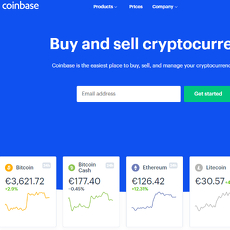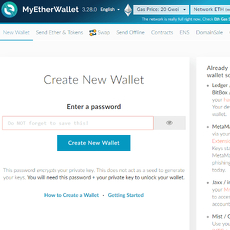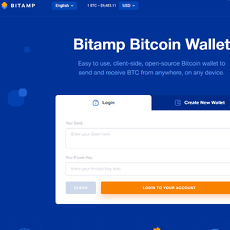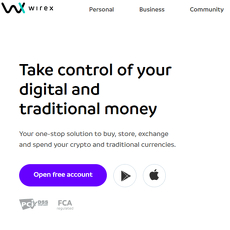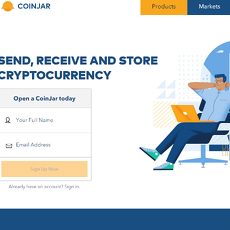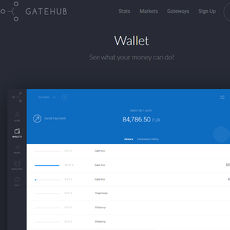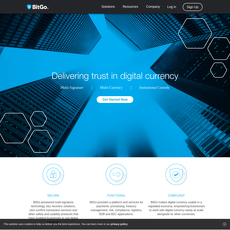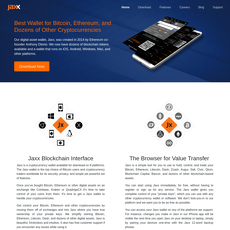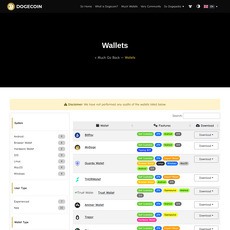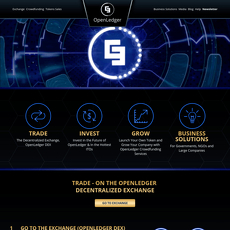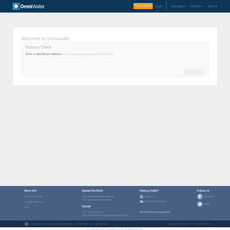Best Crypto Wallets (2026) – Top Bitcoin & Altcoin Wallets Ranked
Cryptocurrency is slowly establishing itself as a global phenomenon, especially now that it has become fashionable to own one. The emergence of cryptocurrency as a valid asset class has spurred the explosion of various crypto sectors, tackling core issues relating to digital assets. One such sector is the cryptocurrency wallet market, which has notably been at the frontline of the crypto narrative.
You will agree that opting for a crypto wallet is one of the core requirements for anyone looking to participate in the crypto market. And judging by the number of options available today, and the relentless cases of crypto thefts, it is imperative to do extensive research before making a choice, as regards the best wallets for cryptocurrency. In this review, we will explore the fundamentals of crypto wallets, highlight some factors to consider when choosing one, and introduce you to our list of best cryptocurrency wallets.
A typical cryptocurrency wallet is a tool for storing private keys, which functions more or less as passwords for accessing digital assets. Also, this technology allows crypto holders to keep track of their digital assets and facilitate transactions. Simply put, crypto wallets are applications or tools that allow crypto holders to track, spend, and store their coins. There are two types of cryptocurrency wallets. These two classes are software and hardware wallet, and both have unique modes of operation that suits participants with varying needs.
A software wallet is a concept that encapsulates applications enabling crypto storage infrastructures. Wallets that fall under this category are online or web-based wallets, mobile wallets, and desktop wallets.
Online cryptocurrency wallets are cloud-based applications, which provide wallet services to crypto practitioners. All users need to do is register on the website, generate a private key, assign cryptocurrency to this key, and start transacting. The simplicity of this process, and the fact that it allows instant access to one’s assets, make online wallets appealing to a larger demographic. However, there is a drawback. Being always connected to the internet makes these wallets susceptible to attacks. Regardless of this downside, online wallets, nonetheless, remain one of the top choices for crypto traders. It allows them to execute trades on crypto exchanges faster since the wallet is always online. If you believe that this type of wallet best suits your needs, then you ought to consider some security measures, to mitigate the chances of losing your funds to crypto thieves, when searching for the best online wallets for cryptocurrency.
Mobile wallets function almost the same way as online crypto-wallets. The only difference is that the former are smartphone applications that help users access their holdings on the go. Since the wallet is a click away on your mobile phone, you can track and perform transactions from anywhere, without having to encounter snags common with web-based wallets. Also, these wallets come with features that make it possible to directly pay for services and products at retail stores that accept cryptocurrencies. While this is a given, mobile wallets have similar security risks associated with online wallets. Likewise, losing your phone could spell doom for your crypto holdings, especially if your mobile wallet provider has not set up measures to help you deactivate your wallet account.
Desktop wallets transcend some of the security frailties associated with the other types of software wallets available today. That said, you will have to download the blockchain of your chosen coin before you can utilize a desktop wallet. Needless to say, this requirement is a major drawback for users, as downloading the entirety of the content of an established blockchain, like Bitcoin and Ethereum, could take a while and require a lot of resources.
From our explanation and classification of software wallets, you will agree that the defining attribute of these wallets is their ability to enable a digital form of storage for private keys. Hardware wallets, on the other hand, are physical tools or devices that can help crypto holders protect their digital assets. Unlike online wallets, hardware wallet providers do not store their customers’ private keys. Instead, they avail devices that enable this function.
Besides, crypto practitioners often refer to these devices as offline wallets, as users have to connect them to the internet whenever they want to perform transactions. As such, hardware wallets are not as susceptible to attacks as software wallets. However, the offline status of these wallets makes them unsuitable to active crypto traders, who ride on the waves of the volatile crypto terrain. There are several hardware wallets available today, and so, it is crucial to carry out extensive research before opting for one.
The fundamentals or the concept of a hardware wallet connotes a system that provides users a way to physically be in custody of their private keys. While this statement enunciates the workings of hardware devices serving as crypto wallets, it also encompasses the practice of storing one’s wallet in printed format. Herein lies the essence of paper wallets, as they allow users to generate private keys online and print it on paper. To carry out transactions, the users would manually enter his or her private key into a crypto transaction portal. Opting for this manual system of storing cryptocurrency has its risks. For one, you could lose the printed copy of your private key, which, in turn, renders your digital asset inaccessible. Also, having multiple copies of the printed form of your private key would make you susceptible to crypto thefts.
Having introduced you to the fundamentals of crypto wallets, the next section highlights some important factors that you should consider when choosing a crypto wallet.
It is common practice for developers to create customized wallets for cryptocurrency projects. That said, other crypto wallets enable a storage system for two or more cryptocurrencies. Therefore, you should consider these variables before opting for a crypto wallet. The questions that you should ask here is: What is the number of cryptocurrencies that make up my crypto portfolio, and do I need more than one wallet to secure my holdings?
For people who only have the desire to own just one coin, utilizing a universal crypto wallet might be unnecessary. Crypto practitioners with diversified portfolios, on the other hand, may need to adopt a crypto wallet that can support an array of coins. However, for security purposes, we advise that you distribute your holdings across multiple wallets to mitigate the threat of losing one’s entire crypto stash to a single attack. Also, instead of focusing on the number of coins a particular crypto wallet support, you should rather ascertain that it has the infrastructure in place to render seamless support for its adopted cryptocurrencies.
Crypto wallets are primarily security tools that enable features that allow users to hide their keys from prying eyes. And so, participants must go the extra mile to ascertain the strengths and weaknesses of cryptocurrency wallets, as regards their security infrastructure. There are standards like encryptions, two-factor authentication, and multi-factor authentication procedures that your crypto wallet should avail. If any of these listed measures are missing on your preferred wallet, then you had better find more capable alternatives.
Multi-factor authentication provides another tier of security layer other than the commonly known username and password verification system. With this feature, you can ascertain that losing your passwords does not give nefarious entities automatic access to your wallet, as they would need to enter an OTP code or pass a biometric authentication process.
Also, you should verify whether the crypto wallet under consideration has partnered with one of the new crops of custodial solutions in the crypto space. This crypto custody platforms offer corporate and insured wallets to crypto firms. Besides, online and mobile wallets, which choose to store private keys on behalf of their users, could subscribe to services to ensure that lost coins are retrievable.
Assessing the accessibility of a crypto wallet has become paramount for practitioners looking to adopt storage systems for their assets. In light of this, you must analyze the frequency of your crypto activities to determine the type of wallet that is most suitable. To a majority of crypto traders, the faster it is to access one’s digital assets, the better. This set of individuals are of the notion that solely relying on an offline wallet is a no-no. In most cases, practitioners prefer to hold a large chunk of their holdings on an offline wallet and dispense a fraction to online or mobile wallets, which facilitate instant transactions.
Apart from instant transaction capabilities, we advise that you ascertain that the crypto wallet can provide storage services for a global market. It is counterproductive for a roaming crypto practitioner to opt for a geo-selective wallet.
The functionalities of crypto wallets make them more or less target practice for hackers. Therefore, wallet providers must constantly assess the security systems of their products to guarantee that there are no loopholes. The ability of a crypto wallet provider to carry out these checks, on a regular, would determine the impregnability of the wallet. Hence, we advise that you confirm that your chosen wallet undergoes security upgrades regularly.
Once you ascertain that your crypto wallet has topnotch security features, then you can start worrying about other added functions. Crypto wallet providers are going to lengths to give users one more reason to adopt their services. Thus, it is common to find crypto calculators, asset trackers, and the likes on an average crypto wallet. We advise that you determine whether the features of the crypto wallet align with your crypto needs. For instance, a serial investor would not think twice before opting for a crypto wallet with historical charting tools for returns. Similarly, a crypto trader would value features that would help him or her file crypto taxes.
We at Cryptolinks are aware that assessing cryptocurrency wallets is not an easy task. Therefore, we have put together a list of top cryptocurrency wallets that did remarkably well after undergoing detailed analysis relating to the recommendations mentioned earlier in this guide. We examined the number of coins each wallet supports as well as the quality of the services made available for these coins.
Thereafter, we explored the security measures put in place to ensure that the wallet is impregnable. Here, we ascertained that the crypto wallets offered multi-factor authentication systems, which adds to the integrity of the wallet. In our opinion, crypto wallets that do not avail these second layer of protection are not serious about their users’ safety. Next, we checked to see if wallet providers that offer custodian services had the infrastructure and business model in place to facilitate insured wallets. With this analysis, we could determine whether these wallets would replace lost coins to users, peradventure they got hacked.
Accessibility also came to play in our analysis, as we verified each wallet’s capacity to provide services to a global market. We are aware that crypto wallets, which are geo-selective, could frustrate roaming crypto practitioners. So, it was best that we completely ignored wallets that fall under this category. After examining accessibility, we took a look at the propensity of the wallet provider to release security updates regularly. This, coupled with their customer service culture, helped us gauge the integrity of the wallet providers.
Lastly, we took a look at the various features, not relating to security, available on each wallet. While carrying out this evaluation, we verified that the added features were easy for users to access and utilize. Also, we verified the relevance of these tools to the needs of users.
In the end, we found 36 crypto wallets that have done exceptionally well after undergoing our thorough assessments. We expect that you will read through our review on each before reaching a decision.
You will agree that opting for a crypto wallet is one of the core requirements for anyone looking to participate in the crypto market. And judging by the number of options available today, and the relentless cases of crypto thefts, it is imperative to do extensive research before making a choice, as regards the best wallets for cryptocurrency. In this review, we will explore the fundamentals of crypto wallets, highlight some factors to consider when choosing one, and introduce you to our list of best cryptocurrency wallets.
What Is a best bitcoin wallet?
A typical cryptocurrency wallet is a tool for storing private keys, which functions more or less as passwords for accessing digital assets. Also, this technology allows crypto holders to keep track of their digital assets and facilitate transactions. Simply put, crypto wallets are applications or tools that allow crypto holders to track, spend, and store their coins. There are two types of cryptocurrency wallets. These two classes are software and hardware wallet, and both have unique modes of operation that suits participants with varying needs.
Software wallets
A software wallet is a concept that encapsulates applications enabling crypto storage infrastructures. Wallets that fall under this category are online or web-based wallets, mobile wallets, and desktop wallets.
Online cryptocurrency wallet
Online cryptocurrency wallets are cloud-based applications, which provide wallet services to crypto practitioners. All users need to do is register on the website, generate a private key, assign cryptocurrency to this key, and start transacting. The simplicity of this process, and the fact that it allows instant access to one’s assets, make online wallets appealing to a larger demographic. However, there is a drawback. Being always connected to the internet makes these wallets susceptible to attacks. Regardless of this downside, online wallets, nonetheless, remain one of the top choices for crypto traders. It allows them to execute trades on crypto exchanges faster since the wallet is always online. If you believe that this type of wallet best suits your needs, then you ought to consider some security measures, to mitigate the chances of losing your funds to crypto thieves, when searching for the best online wallets for cryptocurrency.
Mobile cryptocurrency wallets
Mobile wallets function almost the same way as online crypto-wallets. The only difference is that the former are smartphone applications that help users access their holdings on the go. Since the wallet is a click away on your mobile phone, you can track and perform transactions from anywhere, without having to encounter snags common with web-based wallets. Also, these wallets come with features that make it possible to directly pay for services and products at retail stores that accept cryptocurrencies. While this is a given, mobile wallets have similar security risks associated with online wallets. Likewise, losing your phone could spell doom for your crypto holdings, especially if your mobile wallet provider has not set up measures to help you deactivate your wallet account.
Desktop cryptocurrency wallets
Desktop wallets transcend some of the security frailties associated with the other types of software wallets available today. That said, you will have to download the blockchain of your chosen coin before you can utilize a desktop wallet. Needless to say, this requirement is a major drawback for users, as downloading the entirety of the content of an established blockchain, like Bitcoin and Ethereum, could take a while and require a lot of resources.
Hardware cryptocurrency wallets
From our explanation and classification of software wallets, you will agree that the defining attribute of these wallets is their ability to enable a digital form of storage for private keys. Hardware wallets, on the other hand, are physical tools or devices that can help crypto holders protect their digital assets. Unlike online wallets, hardware wallet providers do not store their customers’ private keys. Instead, they avail devices that enable this function.
Besides, crypto practitioners often refer to these devices as offline wallets, as users have to connect them to the internet whenever they want to perform transactions. As such, hardware wallets are not as susceptible to attacks as software wallets. However, the offline status of these wallets makes them unsuitable to active crypto traders, who ride on the waves of the volatile crypto terrain. There are several hardware wallets available today, and so, it is crucial to carry out extensive research before opting for one.
Paper cryptocurrency wallets
The fundamentals or the concept of a hardware wallet connotes a system that provides users a way to physically be in custody of their private keys. While this statement enunciates the workings of hardware devices serving as crypto wallets, it also encompasses the practice of storing one’s wallet in printed format. Herein lies the essence of paper wallets, as they allow users to generate private keys online and print it on paper. To carry out transactions, the users would manually enter his or her private key into a crypto transaction portal. Opting for this manual system of storing cryptocurrency has its risks. For one, you could lose the printed copy of your private key, which, in turn, renders your digital asset inaccessible. Also, having multiple copies of the printed form of your private key would make you susceptible to crypto thefts.
Having introduced you to the fundamentals of crypto wallets, the next section highlights some important factors that you should consider when choosing a crypto wallet.
What Are the Factors That Should Fuel Your Crypto Wallet Research?
The number of cryptocurrencies that the wallet supports
It is common practice for developers to create customized wallets for cryptocurrency projects. That said, other crypto wallets enable a storage system for two or more cryptocurrencies. Therefore, you should consider these variables before opting for a crypto wallet. The questions that you should ask here is: What is the number of cryptocurrencies that make up my crypto portfolio, and do I need more than one wallet to secure my holdings?
For people who only have the desire to own just one coin, utilizing a universal crypto wallet might be unnecessary. Crypto practitioners with diversified portfolios, on the other hand, may need to adopt a crypto wallet that can support an array of coins. However, for security purposes, we advise that you distribute your holdings across multiple wallets to mitigate the threat of losing one’s entire crypto stash to a single attack. Also, instead of focusing on the number of coins a particular crypto wallet support, you should rather ascertain that it has the infrastructure in place to render seamless support for its adopted cryptocurrencies.
The security features accessible on the crypto wallet
Crypto wallets are primarily security tools that enable features that allow users to hide their keys from prying eyes. And so, participants must go the extra mile to ascertain the strengths and weaknesses of cryptocurrency wallets, as regards their security infrastructure. There are standards like encryptions, two-factor authentication, and multi-factor authentication procedures that your crypto wallet should avail. If any of these listed measures are missing on your preferred wallet, then you had better find more capable alternatives.
Multi-factor authentication provides another tier of security layer other than the commonly known username and password verification system. With this feature, you can ascertain that losing your passwords does not give nefarious entities automatic access to your wallet, as they would need to enter an OTP code or pass a biometric authentication process.
Also, you should verify whether the crypto wallet under consideration has partnered with one of the new crops of custodial solutions in the crypto space. This crypto custody platforms offer corporate and insured wallets to crypto firms. Besides, online and mobile wallets, which choose to store private keys on behalf of their users, could subscribe to services to ensure that lost coins are retrievable.
The accessibility of the crypto wallet
Assessing the accessibility of a crypto wallet has become paramount for practitioners looking to adopt storage systems for their assets. In light of this, you must analyze the frequency of your crypto activities to determine the type of wallet that is most suitable. To a majority of crypto traders, the faster it is to access one’s digital assets, the better. This set of individuals are of the notion that solely relying on an offline wallet is a no-no. In most cases, practitioners prefer to hold a large chunk of their holdings on an offline wallet and dispense a fraction to online or mobile wallets, which facilitate instant transactions.
Apart from instant transaction capabilities, we advise that you ascertain that the crypto wallet can provide storage services for a global market. It is counterproductive for a roaming crypto practitioner to opt for a geo-selective wallet.
The frequency at which the wallet provider releases updates
The functionalities of crypto wallets make them more or less target practice for hackers. Therefore, wallet providers must constantly assess the security systems of their products to guarantee that there are no loopholes. The ability of a crypto wallet provider to carry out these checks, on a regular, would determine the impregnability of the wallet. Hence, we advise that you confirm that your chosen wallet undergoes security upgrades regularly.
The added features of the crypto wallet
Once you ascertain that your crypto wallet has topnotch security features, then you can start worrying about other added functions. Crypto wallet providers are going to lengths to give users one more reason to adopt their services. Thus, it is common to find crypto calculators, asset trackers, and the likes on an average crypto wallet. We advise that you determine whether the features of the crypto wallet align with your crypto needs. For instance, a serial investor would not think twice before opting for a crypto wallet with historical charting tools for returns. Similarly, a crypto trader would value features that would help him or her file crypto taxes.
How Did We Go About Compiling Our List of Best Cryptocurrency Wallets?
We at Cryptolinks are aware that assessing cryptocurrency wallets is not an easy task. Therefore, we have put together a list of top cryptocurrency wallets that did remarkably well after undergoing detailed analysis relating to the recommendations mentioned earlier in this guide. We examined the number of coins each wallet supports as well as the quality of the services made available for these coins.
Thereafter, we explored the security measures put in place to ensure that the wallet is impregnable. Here, we ascertained that the crypto wallets offered multi-factor authentication systems, which adds to the integrity of the wallet. In our opinion, crypto wallets that do not avail these second layer of protection are not serious about their users’ safety. Next, we checked to see if wallet providers that offer custodian services had the infrastructure and business model in place to facilitate insured wallets. With this analysis, we could determine whether these wallets would replace lost coins to users, peradventure they got hacked.
Accessibility also came to play in our analysis, as we verified each wallet’s capacity to provide services to a global market. We are aware that crypto wallets, which are geo-selective, could frustrate roaming crypto practitioners. So, it was best that we completely ignored wallets that fall under this category. After examining accessibility, we took a look at the propensity of the wallet provider to release security updates regularly. This, coupled with their customer service culture, helped us gauge the integrity of the wallet providers.
Lastly, we took a look at the various features, not relating to security, available on each wallet. While carrying out this evaluation, we verified that the added features were easy for users to access and utilize. Also, we verified the relevance of these tools to the needs of users.
In the end, we found 36 crypto wallets that have done exceptionally well after undergoing our thorough assessments. We expect that you will read through our review on each before reaching a decision.
» All Best Cryptocurrency Websites List (5000+ Top Cryptocurrency Sites) «Biggest and most up-to-date best Cryptocurrency websites list that you can find in Crypto World!



